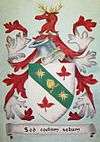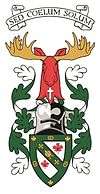Renison University College
Coordinates: 43°28′7″N 80°32′50″W / 43.46861°N 80.54722°W
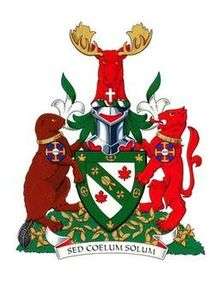 Coat of arms of Renison University College | |||||
Former name | Renison College | ||||
|---|---|---|---|---|---|
| Motto | Sed Coelum Solum | ||||
Motto in English | One Sky Over All | ||||
| Type | Public University | ||||
| Established | 1959 | ||||
| Affiliation | University of Waterloo | ||||
Religious affiliation | Anglican Church of Canada | ||||
| Endowment | $2.4 Million | ||||
| Chairperson | May Yan | ||||
| Chancellor | Dr. Manfred Conrad | ||||
| Principal | The Rev. Canon Dr. Wendy L. Fletcher | ||||
| Dean | Judi Jewinski | ||||
| Visitor | The Rt. Rev. Linda Nicholls (as Bishop of Huron) | ||||
Academic staff | 32[1] | ||||
Administrative staff | 57[2] | ||||
| Undergraduates | 702[3] | ||||
| Postgraduates | 195[4] | ||||
Other students | 220 (Residence Students)[5] | ||||
| Location | Waterloo, Ontario, Canada | ||||
| Degree Programs Offered | Bachelor of Arts, Bachelor of Social Work, Master of Social Work | ||||
| Colors |
| ||||
| Mascot | Reni Moose | ||||
Sporting affiliations | Waterloo Warriors | ||||
| Website |
uwaterloo | ||||
 | |||||
Renison University College is an affiliated university college of the University of Waterloo and located in Waterloo, Ontario, Canada. Renison's campus is situated on the western border of Waterloo's main campus. The university college offers academic programs that count as credit toward a University of Waterloo degree. Most academic courses are offered within Waterloo's Faculty of Arts, focusing on social sciences, language and culture.
Renison focuses its academic work in three primary areas: Social Engagement and Innovation; Global Engagement through Languages and Cultures; and Community Engagement through the offering of non-degree program and praxis-based learning related to various degrees. Renison’s social engagement and Innovation focus is developed in the work of the department of Social Development Studies and Renison’s School of Social Work. The focus on global engagements finds expression in a variety of forms, most notably through the work of the department of Culture and Language Studies and the Studies in Islam program unit. Its focus on Community Engagement is gathered in the Centre for Community and Professional Education.
Renison University College maintains a residence that houses up to 220 University of Waterloo students. Residents may be in any field of undergraduate study at the University of Waterloo and are not mandated to take courses at Renison. The university college residence maintains one of the lowest don to student ratios of all the on-campus residences.
The institution was established on January 14, 1959 as Renison College, under the authority of the Synod of the Anglican Diocese of Huron. In 2010, it officially became Renison University College as a reflection of Renison's academic focus. It was founded by members of the local Anglican community in Waterloo, Ontario and Kitchener, Ontario and continues to be affiliated with the Anglican Church of Canada.
History
Renison was incorporated on January 14, 1959 by provincial Letters Patent and under the authority of the Synod of the Diocese of Huron, due to the efforts of the Kitchener and Waterloo Anglican communities. The efforts of Renison Founder The Ven. Harvey Southcott, who was rector of Church of the Holy Saviour at the time, were particularly influential as he had the original vision for an Anglican college in Waterloo. Renison continues to enjoy support from the Anglican community and, in particular, from within the Diocese.
Originally a two-storey, seven-room house at 193 Albert Street in Waterloo that opened its doors in 1959, Renison College featured a small chapel, chaplain’s office, a small library, a study and meeting space for students, and three bedrooms that accommodated seven male students. The College offered courses in Religious Knowledge, Geography and Philosophy.
On July 1, 1960, Renison struck an affiliation agreement with the University of Waterloo for the right to offer programs in Arts and the Social Sciences for credit towards a Bachelor of Arts degree from Waterloo. The University transferred five acres of land on the west side of its campus to Renison in 1961, and Renison purchased an additional acre.
Name Change
Originally incorporated in 1959 as Renison College, it was felt that the addition of the word ‘university’ would strengthen Renison’s reputation and identity with international partners. During her tenure as Principal, Dr. Gail Cuthbert Brandt had explored the option of gaining an individual charter for Renison. However, it wasn't until Dr. John Crossley’s tenure in the mid-2000s that the process began to move forward.[6] In 2010, following years of negotiations, supplementary Letters Patent were issued by the Government of Ontario, making the official name of the college 'Renison University College' and reflecting Renison's academic focus.
Namesake
Renison University College was named after a contemporary Canadian church leader, The Most Reverend Robert John Renison. Archbishop Renison served in the Anglican Church of Canada with great distinction for nearly six decades, a significant amount of that time being spent in Northern Ontario. Before his death in 1957, he became Metropolitan of Ontario and Archbishop of Moosonee. Archbishop Renison’s widow, Elisabeth, presented the College with his portrait and a painting of his personal coat of arms. The family agreed to let the new institution use his heraldic emblem and accompanying motto, Sed Coelum Solum (one sky over all), until the college was granted its own unique coat of arms in 1978.
Campus
Renison is situated on 6 acres of land in Waterloo, Ontario and is directly adjacent to the University of Waterloo campus. Most buildings on the University of Waterloo campus are a five-minute walk from Renison. Renison’s campus is bordered by the University of Waterloo, St. Jerome’s University and St. Paul’s University College. One numbered road intersects Renison’s campus: Westmount Road North.
Buildings
In 1962, Renison completed its first building on the current campus, the Founders Building, which provided offices, classrooms, and two residence wings to house 40 men and 40 women. The cornerstone of this first building on Renison’s campus was laid by Elizabeth Renison and LCol. The Hon. J. Keiller MacKay, 19th Lieutenant Governor of Ontario.
Thanks to Renison and the other affiliated colleges, 1962 was the first time Waterloo students could live on campus as the first Waterloo residence would not be opened until 1965.[7]
In 1964, Renison expanded with the construction of the Luxton Building, with classrooms, faculty offices, and a residence for 98 men, allowing the Founders Building to be used as the women’s residence. This building was named for The Rt. Rev. George N. Luxton, Bishop of Huron and Renison’s first Chancellor and, later, first Visitor. The Luxton Building would also come to include a favourite place for student relaxation at Renison, the Moose Room.
Then, in 1992, the College expanded further with the addition of the Chapel of St. Bede, the Great Hall cafeteria, two additional residence floors, and an enlarged library. This would be followed in 2005 with the addition of the Academic Centre. This building included six large classrooms, office space to accommodate Renison’s growing faculty and staff, the Keiko and Charles Belair Centre for East Asian Studies, a substantially larger library with meeting rooms and the Ministry Centre.
2013 saw the completion of the East Side Extension, which is home to new classroom space, student lounges, and Renison’s School of Social Work. Ontario’s 28th Lieutenant Governor, The Hon. David C. Onley, was in attendance at the grand opening to declare the building officially open.
Renison completed its newest building in 2015 and was opened by His Excellency The Right Hon. David Johnston, Governor General of Canada and former president of the University of Waterloo. This building is home to Renison’s English Language Institute and English Language Studies. With 17 new classrooms, the complex also features student lounges, meeting rooms, a glass atrium capable of hosting small events, and office space for staff and faculty members.
Lusi Wong Library
Renison houses the Lusi Wong Library, whose collection focuses on the subjects taught at Renison. Renison students have access to over 7 million items within the library's resources through the Tri-University Group of Libraries (TUG) system. TUG is part of a partnership involving the libraries of the University of Waterloo, Wilfrid Laurier University, and the University of Guelph. Students have access to library resources totaling 7.5 million items through the automated library system. Renison students are able to borrow books and other resources from any of the three libraries and have them delivered to the Lusi Wong Library for pick-up. Likewise, any books borrowed from these three universities’ libraries can be returned at Renison. Study rooms are available for students to book for group work or small meetings. In a poll conducted by the University of Waterloo’s student newspaper, The Imprint, Renison’s Lusi Wong Library was voted the best place to study on campus.
The Luscott Ministry Centre
Renison is home to the Luscott Ministry Centre, where all students, staff, and faculty have the opportunity to relax on couches, enjoy free coffee, tea, and cookies, and make use of a variety of stress relief activities. The Ministry Centre contains the offices of the Renison Institute of Ministry and Renison’s Chaplain, with whom many students, staff, and faculty discuss questions (big and small), concerns, and joys. The Ministry Centre is a meeting place where community forms, faith is a welcome part of conversation, and transformation is championed.
Chapel of St. Bede
The Chapel of St. Bede is the Anglican chapel at Renison University College, and is part of the Diocese of Huron. Sunday morning worship is held here, along with midweek prayers, and is officiated by the College's chaplain. A labyrinth is set out once a month. The chapel is also available for anyone to use for prayer or meditation.
Administration
The College operates under a unicameral system consisting of a Board of Governors. The Board of Governors has responsibility for the university's properties, affairs and income and determines approval for tenure and sabbatical for professors of the College.
The Board of Governors consists of nine ex officio members including the College's chancellor, principal, the president of the University of Waterloo, a representative of the Anglican Diocese of Huron, one representative for the faculty and one for the staff, and the presidents of both the residence and academic student governments of Renison. The other nine members of the board are elected members. One of these members must be a representative of the Anglican Diocese of Niagara and at least one member of the Board must be an alumnus/alumna of Renison.
The Principal, appointed by the Board of Governors, acts as the chief executive officer of the college and is responsible for administering the affairs of the college. The Principal acts on behalf of the Board with respect to the operational management and control of the College. The Principal is the chair of Academic Council and is a member of the Board. The Principal is appointed for a term of five years with the possibility of renewal. The principal also holds the position of Vice-Chancellor of the College, assuming the duties of the Chancellor during his/her absence or temporary vacancy in the office. The current principal is The Rev. Canon Dr. Wendy L. Fletcher who began her term as the seventh principal of the College in August, 2014.
The Chancellor, who serves as the titular head of the College, is elected by the members of the Board for a term of four years with the possibility of renewal. The primary duty of the Chancellor is to preside at all Renison convocations, and grant honours to candidates on behalf of the College at Founders Day. The office of the Chancellor is currently held by Manfred Conrad, who began his term in office in 2016.
The Visitor to the College is the Bishop of the Anglican Diocese of Huron, currently The Rt. Rev. Linda Nicholls. The Visitor is a member of the corporation of Renison University College and maintains the right to inspect the state of the college from time to time. The Visitor may also make comment on the state of the College to the Board of Governors and/or the Principal.
Academics
Renison focuses its academic work in three primary areas: Social Engagement and Innovation; Global Engagement through Languages and Cultures; and Community Engagement through the offering of non-degree program and praxis-based learning related to various degrees. Renison’s social engagement and Innovation focus is developed in the work of the department of Social Development Studies and Renison’s School of Social Work. The focus on global engagements finds expression in a variety of forms, most notably through the work of the department of Culture and Language Studies and the Studies in Islam program unit. Its focus on Community Engagement is gathered in the Centre for Community and Professional Education.
Liberal Arts
Renison University College offers courses and undergraduate programs in the Liberal Arts, the Humanities, and the Social Sciences for credit towards a Bachelor of Arts degree from the University of Waterloo.
Social Development Studies
Social Development Studies is a unique, multi-faceted Bachelor of Arts program that provides a well-rounded background in the social sciences and gives students the knowledge and skills to promote and implement social change. It prepares students for a breadth of careers, including social work, education, communications, law, and working in community and international service organizations. The program can be completed full-time or part-time, through on-campus, online and mixed delivery.
Culture and Language Studies
The Culture and Language Studies (CLS) department offers academic minors towards degrees granted by the University of Waterloo in Applied Language Studies and East Asian Studies. The department also offers a variety of certificates and diplomas, offering degree credit courses in Applied Language Studies, Chinese, East Asian Studies, English for Multilingual Speakers, Japanese, and Korean that contribute to these programs. The CLS department also supports Renison and University of Waterloo students by offering credit courses in English, Fine Arts, History, and Religious Studies.
Studies in Islam
Studies in Islam is an interdisciplinary program that introduces students to the mosaic of Muslim cultures and civilizations. The goal of this program is to help students discover the history and contributions of Islam as a crucial part of many shared cultures. Courses available through this program can lead to a minor in Studies in Islam for University of Waterloo students. A diploma in Studies in Islam is also available. Topics covered in this program’s courses include: fine arts, language and literature, drama, history, politics, science, anthropology, social development, and gender and sex.
A diploma or certificate in Arabic Language is also available through this program.
School of Social Work
Renison maintains a School of Social Work through which students can obtain a Bachelor of Social Work (BSW) and a Master of Social Work (MSW) from the University of Waterloo.
Bachelor of Social Work
The Bachelor of Social Work is offered as a full-time or part-time professional, generalist degree program. The program prepares students for ethical, critically reflective, anti-oppressive, competent and accountable social work practice. Field practicums are a requirement of the program in addition to in-class lectures.
Master of Social Work
The Master of Social Work is Canada’s first health-focused, online Master of Social Work (MSW) program. The MSW Program is being offered for full-time or part-time study in collaboration with the Faculty of Applied Health Sciences at the University of Waterloo. A Bachelor of Social Work (BSW) degree is a mandatory entrance requirement.
Centre for Community and Professional Education
The Centre for Community and Professional Education (CAPE) was founded in 2015 through the unification of various institutes and programs within the Renison community including the English Language Institute, the Renison Institute of Ministry, the Renison International Office, the Confucius Institute, the King Sejong Institute, Sakura Japanese language school, and Japanese non-credit courses. CAPE offers non-credit courses, workshops as well as special events and programs that explore topics such as language, culture, and spirituality. These are all available for the community at large and do not require enrollment for a degree at the University of Waterloo.
Lifelong Language Learning
The Lifelong Language Learning (LLL) program within CAPE offers an array of non-credit language and culture courses offered by the Confucius Institute (CI), the King Sejong Institute (KSI), and Japanese program coordinators; these courses cover a wide array of topics from basic language acquisition to traditional medicine to Japanese manga.
Renison Institute of Ministry
The Renison Institute of Ministry (RIM) offers theologically and biblically based courses, workshops, and events. They cover a variety of topics including but not limited to: topical issues such as physician assisted dying and water justice; pastoral care, preaching, congregational development, church history, biblical studies, theology, spirituality; and multi-faith dialogues. Participants can earn a Certificate in Christian Studies or a Licentiate in Theology (in partnership with Huron University College).
Renison International Office
The Renison International Office (RIO) offers opportunities for students wanting to study abroad, immigration advising, and an array of customizable programs. In addition, RIO is also a certified International English Language Testing System (IELTS) testing centre.
English Language Institute
Renison University College’s English Language Institute (ELI) has offered high-quality English as a second language (ESL) programs and courses since 1970, and is the official English as a Second Language (ESL) provider for the University of Waterloo. Renison ELI welcomes over 1000 students per year from countries across the globe, and is a founding member of Canada’s largest body for language program accreditation, Languages Canada. Renison ELI offers a variety of non-credit ESL programs, including English for Academic Success (EFAS), a rigorous academic ESL program designed to meet the English language requirement for the University of Waterloo; English for Success (EFS), a summer English immersion experience centred on English conversation and Canadian cultural experiences; and General English at Renison (GEAR), a four-week general English program designed to improve students’ reading, writing, and speaking skills. As well, Renison ELI offers the Bridge to Academic Success in English (BASE) Program, a conditional undergraduate pathway program offered in conjunction with participating faculties at the University of Waterloo.

Mascot
Renison University College's mascot is Reni Moose. Reni has represented the College at a variety of events including Orientation Week, Waterloo Warriors hockey games, convocations, Renison's East Asian Festival, to name but a few. Renison uses a moose as its mascot as its namesake, The Most Reverend Robert Renison, was the Archbishop of Moosonee. A moose is also found in the crest of Renison's coat of arms and College Badge.
Honours granted by Renison
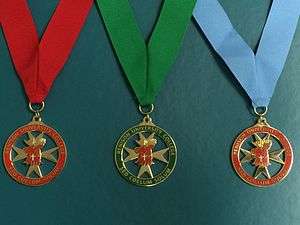
Renison University College grants several honours to individuals that have provided exceptional service to the College, to the Anglican Church, to Canada or to their community. The honours are bestowed by the Chancellor at the annual Founders' Day celebration which celebrates the founders of the College and marks the founding of Renison.
Fellow
Retired members of the Faculty of Renison University College are eligible to receive the designation of Fellow of the College. This designation may also be granted to persons who have served as volunteers on the Board of Governors or who have contributed to the College through activities associated with Advancement. The recipient of this honour must have made substantial noteworthy contribution to the College.[8]
Insignia: Badge of the College within a circular border of green, upon which is inscribed the name and motto of the College, suspended from a green ribbon.
Honorary Senior Fellow
The Honorary Senior Fellowship is Renison's equivalent to honorary doctorates awarded by degree-granting universities. It is granted to persons who have distinguished themselves in the wider community through their contributions to Renison, the University of Waterloo, the Anglican Church, the wider Community of Kitchener-Waterloo, to Ontario or to Canada, and, generally, have some affinity with the College. This award has also been granted frequently to retired Chairs of the Board of Governors.[9]
Insignia: Badge of the College within a circular border of red, upon which is inscribed the name and motto of the College, suspended from a red ribbon.
Honorary Member
Honorary Membership is normally granted only to retired members of the staff of Renison University College. The nominee must have made noteworthy contribution to the College during the period of his or her employment at Renison.[10]
Insignia: Badge of the College within a circular border of pale blue, upon which is inscribed the name and motto of the College, suspended from a pale blue ribbon.
Distinguished Alumni Award
The designation Distinguished Alumnus or Alumna is granted to persons who, having graduated from academic programs administered by the College OR lived in residence at Renison for two terms within one academic year, have pursued and gained notable recognition in a subsequent career.[11]
Insignia: Badge of the College within a circular border of green, upon which is inscribed the name and motto of the College, suspended from a gold ribbon.
Teaching Excellence Award
The Teaching Excellence Award recognizes excellent teaching in a given year for presenters of at least one credit course offered by Renison University College. The nominee for this award must have received excellent teaching evaluations from the Academic Dean and/or the Principal, for teaching in at least one credit course offered by the College. Other indicators of teaching excellence may be cited, including, but not exclusively, performance in formal or informal tutorial situations, preparation and use of outstanding teaching materials, etc.[12]
Emeritus
Upon their retirement, Renison University College has recognized several individuals that have provided exemplary service and leadership to the College and the University of Waterloo with the title 'Emeritus'.[13]
Insignia: Badge of the College within a circular border of red, upon which is inscribed the name and motto of the College, suspended from a purple ribbon.
Founder
The designation of ‘Founder’ has only been granted to those whose names appear on the incorporating Letters Patent of the College.[14]
Insignia: Badge of the College within a circular border of dark blue, upon which is inscribed the name and motto of the College, suspended from a dark blue ribbon.
Coat of Arms and other insignia
 |
|
∗All heraldic devices belonging to Renison University College have been registered with the Canadian Heraldic Authority.
Convocation Regalia
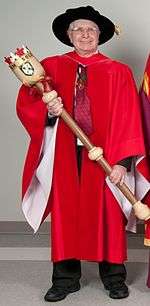
Renison’s convocation regalia, a mace and two staves, were gifts to the College by The Rt. Rev. D. Ralph Spence and Mrs. Carol Spence on the occasion of Bishop Spence’s Installation as Renison’s eighth chancellor.
The Mace
Maces have been used to symbolize authority and order since early medieval times. Parliaments, universities and civic governments use a mace to remind all that their right to govern and teach comes from the Crown; in Renison’s case, the Crown in Right of Ontario.
Renison’s mace is made of local wood from the Waterloo area and fashioned by local artisans. It follows the shape of most maces with a crown, a bowl, and a wooden shaft. The Mace is to be carried by an honoured member of the College in front of the Chancellor at Convocations and special ceremonies.
The crown is carved with maple leaves and trilliums, reflecting the institution of the Crown in Canada and Ontario. The bowl has three coats of arms; Renison University College, University of Waterloo, and the personal arms of The Rt. Rev. Spence. Carved moose heads, derived from the crest of the coat of arms, support the bowl.
Down the shaft of the mace is the small coat of arms belonging to The Rev. Canon David Bowyer, Honorary Senior Fellow of Renison and painter of the arms located on the mace.
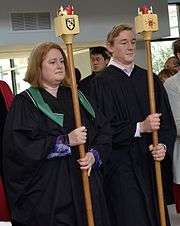
The Staves
Normally carried by two students, the two Processional Staves lead the academic procession. Each bears Renison’s shield and badge of the College. They represent the two halves of Renison’s student body: the residents and the academic students.
Convocation Robes
Chancellor
The Chancellor of Renison University College wears red and maroon robes with gold braiding, in addition to a maroon Tudor bonnet with a gold cord and tassel. The colour gold is used to indicate the Chancellor's senior position in the College.
Principal and Vice-Chancellor
The Principal and Vice-Chancellor of Renison University College wears red and maroon robes with silver braiding, in addition to a maroon Tudor bonnet with a silver cord and tassel. The colour silver indicates the Principal and Vice-Chancellor's secondary position in the hierarchy of the College.
Chair of the Board of Governors
The Chair of the Board of Governors of Renison University College wears green robes with gold braiding.
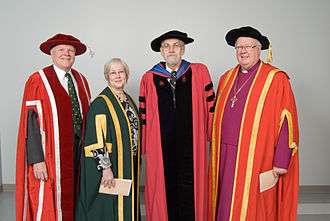
See also
Books
- Dr. Gail Cuthbert Brandt 'Bold and Courageous Dreams' Renison University College © 2008
- Dr. Kenneth McLaughlin 'Enthusiasm for the Truth: An Illustrated History of Saint Jerome's University', (Waterloo: University of Waterloo Press © 2002)
- Dr. Kenneth McLaughlin 'Waterloo: The Unconventional Founding of an Unconventional University' (Waterloo: University of Waterloo Press © 1997)
- Dr. Kenneth McLaughlin 'Out of the Shadow of Orthodoxy: Waterloo @ 50' (Waterloo: University of Waterloo Press © 2007)
- Professor Brian McKillop, 'Matters of Mind: The University in Ontario, 1791-1951' (Ottawa: University of Ottawa Press ©1951)
References
- ↑ Full time and part time, permanent faculty only. Does not include definite term faculty.
- ↑ Full time and part time, permanent staff only. Does not include definite term staff.
- ↑ As of November 10, 2016
- ↑ As of November 8, 2016
- ↑ Total capacity of Renison's residence
- ↑ Dr. Gail Cuthbert Brandt 'Bold and Courageous Dreams' Renison University College, 2014, pg. 108
- ↑ Dr. Gail Cuthbert Brandt 'Bold and Courageous Dreams' Renison University College, 2014, pg. 25-26
- ↑ https://uwaterloo.ca/renison/about-us/renison-honours
- ↑ https://uwaterloo.ca/renison/about-us/renison-honours
- ↑ https://uwaterloo.ca/renison/about-us/renison-honours
- ↑ https://uwaterloo.ca/renison/about-us/renison-honours
- ↑ https://uwaterloo.ca/renison/about-us/renison-honours
- ↑ https://uwaterloo.ca/renison/about-us/renison-honours
- ↑ https://uwaterloo.ca/renison/about-us/renison-honours
- ↑ https://uwaterloo.ca/renison/about-us/coat-arms
- ↑ https://uwaterloo.ca/renison/about-us/coat-arms
- ↑ https://uwaterloo.ca/renison/about-us/coat-arms
- ↑ https://uwaterloo.ca/renison/about-us/coat-arms
- ↑ https://uwaterloo.ca/renison/about-us/coat-arms
- ↑ https://uwaterloo.ca/renison/about-us/coat-arms
- ↑ http://reg.gg.ca/heraldry/pub-reg/project-pic.asp?lang=e&ProjectID=1418&ProjectElementID=4744
- ↑ https://uwaterloo.ca/renison/about-us/coat-arms
- ↑ http://reg.gg.ca/heraldry/pub-reg/project-pic.asp?lang=e&ProjectID=1418&ProjectElementID=4744
External links
| Wikimedia Commons has media related to Renison University College. |
